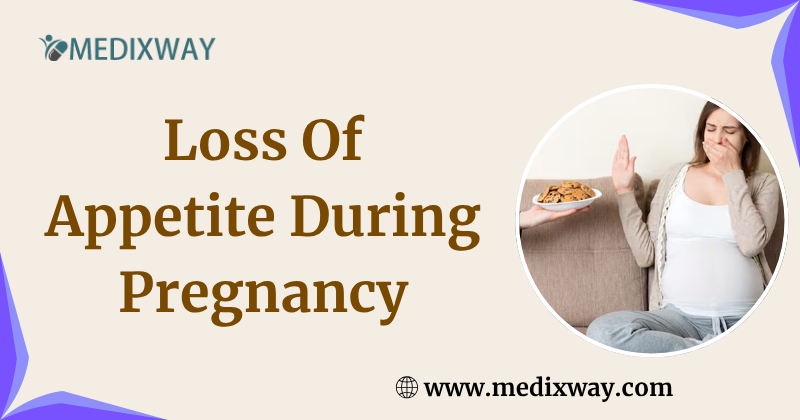Loss Of Appetite During Pregnancy: Causes, Remedies & Nutrition Tips

Generally, pregnant women require more food than usual to maintain their own health and that of the fetus. This is also the reason why they tend to feel hungrier, which is quite normal. Sometimes women can also undergo loss of appetite due to hormonal reasons. This is acceptable if it happened a few times, but if it happens quite often, making you feel nauseous after eating or reducing the willingness to take food, then it can be a matter of concern. In this blog, we will provide you with the causes, along with the remedies to counter the loss of appetite during pregnancy, to help you deal with the situation.
What Causes Loss Of Appetite During Pregnancy?
For women who are pregnant for the first time, they might wonder whether is it normal to have loss of appetite during pregnancy. This query is raised in their mind when they start feeling less hungry or find their favorite food unappealing, even if they are hungry. There can be various reasons behind their condition, ranging from simple hormonal changes to some pregnancy complications.
Let’s look into all the causes in detail.
Morning Sickness
This is experienced mostly during the first trimester, which causes nausea and vomiting, and ultimately losing interest in eating food. This is triggered more by a certain smell or some food. It gives quite an unpleasant feeling throughout the day, with its additional symptoms like dizziness, headache, and a metallic taste in the mouth. Morning sickness usually goes away at the end of the first trimester. These are caused due to low blood sugar and an increase in estrogen.
Anxiety and Depression
Most pregnant women tend to face a loss of appetite due to their mental health condition. They get affected by anxiety and depression due to a variety of changes their body has to undergo during this period. There can also be certain other reasons, like having a history of mental disorders or suddenly stopping the prescribed drugs. These mental conditions are often neglected by women and left untreated because they feel ashamed to talk about them. As a result of this, the health of the baby and the mother is greatly affected.
Medicines
Certain drugs taken during pregnancy can have side effects that would lead to loss of appetite. They can affect the digestive system directly, which would ultimately lessen hunger. These medicines might be beneficial for other aspects during pregnancy, but they also have other demerits.
The drugs are:
- Prozac
- Zoloft
- Cipro
- Hydralazine
- Digoxin
- Buprenorphine
- Phentermine
- Ibuprofen
- Topiramate
Indigestion and Heartburn
The growing baby can put pressure on the stomach, which often causes indigestion, leading to loss of appetite. Other factors, like eating spicy, fatty foods, fruit juices, caffeine, and food in large quantities, can also cause indigestion. The increase in the progesterone level slows down the food movement and also the acid production, which results in indigestion and heartburn, ultimately leading to loss of appetite.
Symptoms
The body shows several symptoms of loss of appetite, including:
- Nausea
- Vomiting
- Fatigue
- Mood swings
- Weakness
- Diziness
- Feeling full
- Bloating
- Indigestion
- Constipation
What Helps With Loss Of Appetite During Pregnancy?
You must take several measures to increase your appetite level. This is essential because if the body does not receive enough nutrients, then it might affect the growth of the fetus and also the health of the mother.
Foods To Prioritize
The only solution for how to deal with loss of appetite during pregnancy is to take sufficient food whenever you feel hungry. There are certain foods that you must take every day, even if you are not able to take a large quantity of food. They are:
- Protein-rich snacks
- Vegetables containing lots of fiber
- Various soups and smoothies
- Try eating bland foods that are not spicy.
You have to take certain measures if you want to solve the problem of no appetite during pregnancy. Such as:
- Take food in smaller amounts and at frequent intervals rather than eating a huge quantity at once.
- Do not force yourself to eat foods that you don’t want to eat, even if they are healthy.
- If you do not feel like drinking plain water, then you can go for other sources, but it’s most important to hydrate yourself enough.
- Eat whatever you feel like eating whenever you feel hungry.
Conclusion
We hope to have conveyed to you all the factors responsible for the loss of appetite in early pregnancy. You can see for yourself which among the above reasons is the cause behind the loss of your appetite and hence choose the solution accordingly. Eat food in small quantities, even if you do not feel like eating, so that you or the baby do not face nutrient deficiencies. Consult the doctor in case of any emergencies and seek advice from them.
